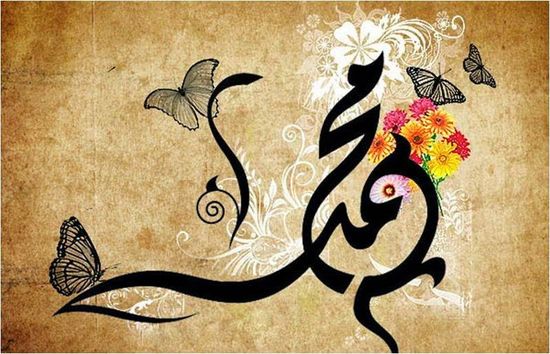Abdul Muttalib's Happiness on Prophet Muhammad's ﷺ Birth
Published on: 22-Aug-2022
(Cite: Khan, Dr. (Mufti) Imran & Hamdani, Mufti Shah Rafi Uddin. (2022, August 22). Abdul Muttalib's Happiness on Prophet Muhammad's  Birth. Encyclopedia of Muhammad
Birth. Encyclopedia of Muhammad  .)
.)
When Prophet Muhammad  was born, Abdul Muttalib and other relatives expressed their joy in different manners. When Abu Lahab (Uncle of the Holy Prophet
was born, Abdul Muttalib and other relatives expressed their joy in different manners. When Abu Lahab (Uncle of the Holy Prophet  ) heard about it, he freed his concubine named Thuwaiyba
) heard about it, he freed his concubine named Thuwaiyba  .1 Regarding Abdul Muttalib’s celebrations, Ibn Saad states:
.1 Regarding Abdul Muttalib’s celebrations, Ibn Saad states:
لما ولدت آمنة بنت وهب رسول اللّٰه أرسلت إلى عبد المطلب فجاءه البشير وهو جالس فى الحجر معه ولده ورجال من قومه فأخبره أن آمنة ولدت غلاما فسر ذلك عبد المطلب وقام هو ومن كان معه فدخل عليها فأخبرته بكل ما رأت وما قيل لها وما أمرت به قال: فأخذه عبد المطلب فأدخله الكعبة.2
When Aaminah bint Wahbgave birth to the Holy Prophet
, the good news was sent out to Abdul Muttalib. The messenger came to Abdul Muttalib, who was at the area of Hijr with his children and other people. When the man told Abdul Muttalib that Aaminah
had given birth to a boy, Abdul Muttalib became so happy that he stood up and the people around him stood up as well. Abdul Muttalib then went to visit Aaminah
, where she shared all the accounts of his birth with him and reported about the orders given for the Holy Prophet
. Narrators say that Abdul Muttalib held the child and took him to Ka'bah to pay gratitude.
Ibn Ishaq adds that Abdul Muttalib took the Holy Prophet  inside the Ka’bah, prayed to Allah Almighty and thanked Him for this blessing.3 Then he praised Allah Almighty and recited the following poetry:
inside the Ka’bah, prayed to Allah Almighty and thanked Him for this blessing.3 Then he praised Allah Almighty and recited the following poetry:
الحمد للّٰه الذى اعطانى هذا الغلام الطیب الاردان
قد سادفى المھد على الغلمان اعیذہ بالبیت ذى الاركان
حتی اراہ بالغ البنیان اعیذہ من شرذى شنان
من حاسد مضطرب العیان 4
All Praise be to Allah, who bestowed me with this child in pure clothes and an exalted status, who surpassed other children being in his cradle. I give him in the protection of this house of Allah that has sacred pillars and corners. Even I desire to see him in his complete mighty youth. I give him in the protection of Allah from the evil of enmity, and the evil of the envious, whose eyes suffer from the disease of envy.
Ibn Saad has copied the aforementioned poetry as well.5 Later on, Abdul Muttalib quoted a lot of poetry in the honor and affection of his grandson, regarding his beauty and elegance.6
The nur (light) of the Holy Prophet  , which was transferred from Adam
, which was transferred from Adam  till Abdullah
till Abdullah  , entered this world via the wedlock of Abdullah ibn Abdul Muttalib
, entered this world via the wedlock of Abdullah ibn Abdul Muttalib and Aaminah binte Wahb
and Aaminah binte Wahb . The greatness of Prophet Muhammad
. The greatness of Prophet Muhammad  , which was foretold in the dreams of his father and grandfather, and other religious scriptures, was then seen by the world as he grew older.
, which was foretold in the dreams of his father and grandfather, and other religious scriptures, was then seen by the world as he grew older.
- 1 Abu Muhammad Mahmood ibn Ahmed Badar Al-Din Al-A’ini (N.D.), U’mda tu Al-Qari Sharah Sahih Bukhari, Dar Ihya Al-Turath Al-Arabi, Beirut, Lebanon, Vol. 20, Pg. 95.
- 2 Muhammad ibn Saad Al-Basri (1990), Tabaqat Al-Kubra, Dar Al-Kutub Al-Ilmiyah, Beirut, Lebanon, Vol. 1, Pg. 82.
- 3 Muhammad ibn Ishaq ibn Yasar Al-Madani (2009), Al-Seerat Al-Nabawiyah le-ibn Ishaq, Dar Al-Kutub Al-Ilmiyah, Beirut, Lebanon, Pg. 97.
- 4 Abu Al-Faraj Abd Al-Rahman ibn Jauzi (2009), Sifat Al-Safwah, Dar Al-Hadith, Cairo, Egypt, Vol. 1, Pg. 22.
- 5 Muhammad ibn Saad Al-Basri (1990), Tabaqat Al-Kubra, Dar Al-Kutub Al-Ilmiyah, Beirut, Lebanon, Vol. 1, Pg. 83.
- 6 Abd Al-Rahman ibn Abdullah Al-Suhaili (1412 A.H.), Al-Raudh Al-Unf fe-Sharha Al-Seerat Al-Nabawiyah, Dar Al-Ihya Al-Turath Al-Arabi, Beirut, Lebanon, Vol. 2, Pg. 157.